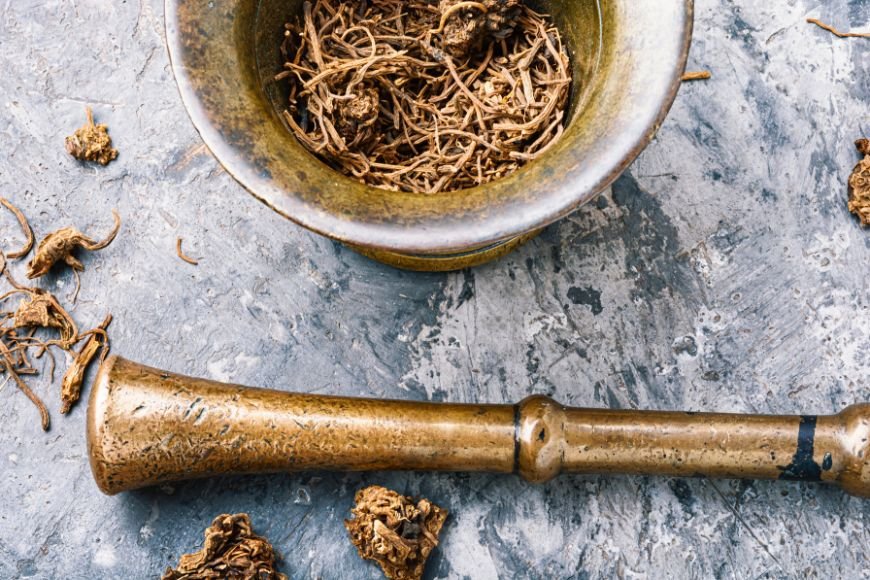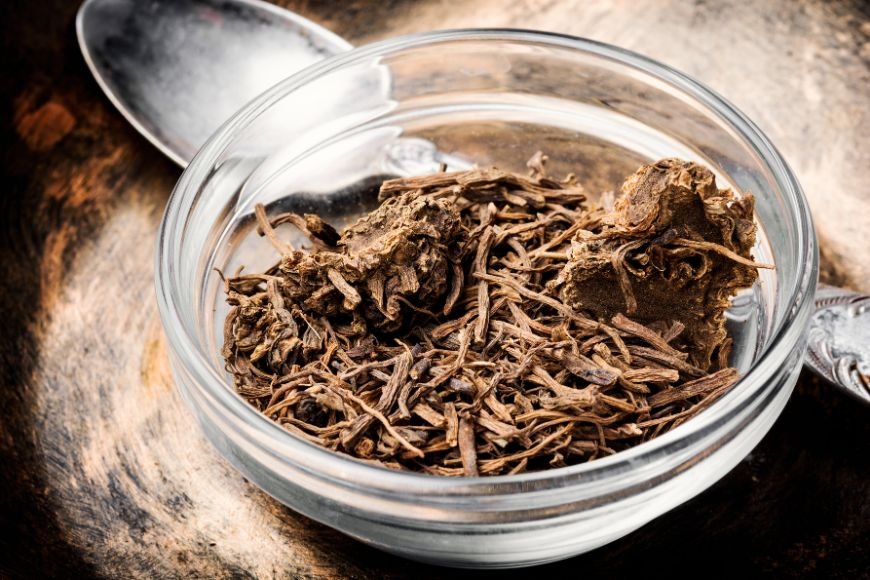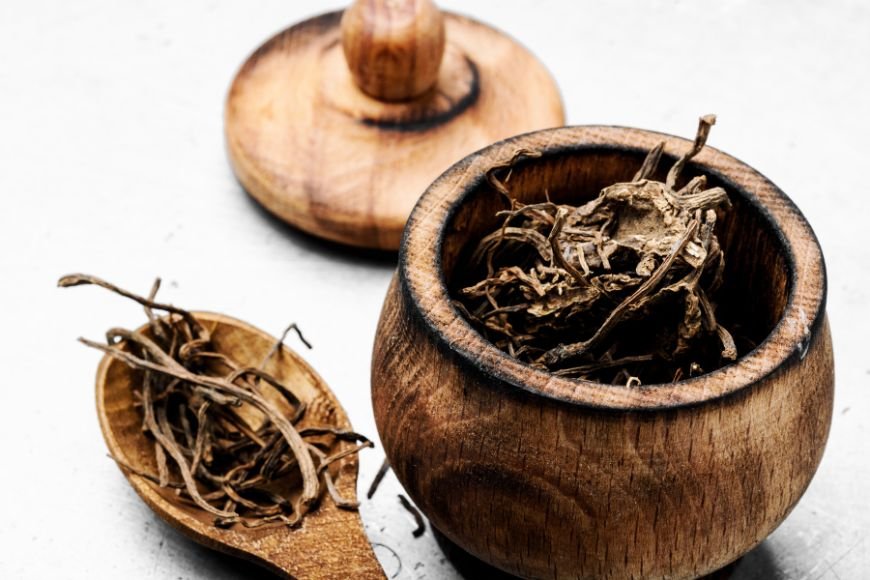If you read the ingredients of any sleeping aid supplement, you’ll probably find that it contains valerian root. It’s no surprise since it promotes better sleep and fights anxiety.
But if you’re trying to go all natural like me, you’re probably thinking, how about valerian root for tea? And what are its possible side effects?
Look no further for the answers!
In this article, we’ll tell you everything you need to know about the benefits and potential side effects of this magic sleep potion. So, grab a cup of your favorite tea and keep reading!
What Is Valerian Tea?

Valerian tea is a drink that mainly contains dried roots, rhizomes, and underground stems of the plant Valerianaofficinalis.
Fun fact: The plant is known for its distinct, weird smell that many people describe as similar to “dirty socks.”
But your drink won’t smell this bad. Take my word for it! In fact, valerian tea is rather delicious, and it has earthy notes that are out of this world.
Still, if you don’t like the taste, you can add some honey to sweeten it and elevate the flavor.
Pro tip: the longer you steep the tea, the stronger the taste will be. So, if you’re still getting used to the flavor, keep it light and add a sweetener.
You can also go for a blend that contains organic valerian roots. The aroma and taste of the other ingredients will mask the unpleasant flavor of the valerian plant.
Valerian Root Tea Possible Benefits
Let’s take a look at the benefits and uses of this magical drink.
1. Helps With Insomnia and Promotes Better Sleep
Whether you’re struggling to fall asleep or you wake up many times during the night, a cup of valerian root tea might be all you need.
Promoting better sleep is one of the main reasons the plant has become the main ingredient in many sleeping supplements.
Not only will it help you fall asleep, but it can also improve the quality of deep sleep. And the better the quality of your deep sleep is, the more rested you’ll feel the next day.
But does it actually work?
The answer is yes! A 2020 study showed that valerian root could be safe and effective for promoting better sleep and preventing associated disorders.
Pro tip: To get the best results, brew a fresh cup 30 minutes to 2 hours before bedtime and drink it right away. The longer the tea sits after brewing, the less effective it may be.

2. May Ease Stress and Anxiety Symptoms
Nothing eases anxiety and stress symptoms better than a cup of valerian root, especially if you combine it with chamomile.
A 2021 study showed that consuming around 530 mg of valerian before bedtime for a month can improve anxiety symptoms. It also showed that it helps with the overall mood and, therefore, might improve depression symptoms.
Since it promotes calmness, a 2014 study focused on its properties to help with hyperactivity. And the results were surprisingly positive.
3. Might Help in Managing Menopause Symptoms
Menopause comes with a lot of annoying symptoms, including hot flashes, sleeping problems, and mood changes. Valerian roots check all the boxes for easing menopause symptoms.
It doesn’t only help with sleeping quality; it also reduces hot flashes in menopausal and postmenopausal women.
On top of that, it promotes relaxation and combats anxiety, which can be helpful at this stage.
Valerian Root Tea Potential Side Effects
Unfortunately, this magical plant doesn’t come without side effects. Although these side effects aren’t common, you need to know about them before consuming the tea regularly.
Here are some of the side effects you may experience:
- Headache
- Mental dullness
- Vivid dreams
- Dizziness
- Stomachache
- Diarrhea
- Weird taste in the mouth
- Extra sleepiness and drowsiness with alcohol
Pregnancy and Breastfeeding
Valerian root tea and supplements aren’t safe to consume during pregnancy and breastfeeding. Unless it’s recommended and monitored by a medical professional, you should skip out on this one.
Children
There isn’t enough data to prove valerian’s safety for children. So, it’s best to stay on the safe side.
Drug Interaction
Since the tea has potent medicinal properties, it can interact with some medications. Here’s a list of some of these medications:

- Alprazolam and benzodiazepines: Can cause extra sleepiness.
- CNS depressants and sedatives: Might lead to slowed breathing and extra sleepiness.
- Cetirizine and allergy medications: May cause extra sleepiness and drowsiness.
If you’re taking any of these medications, please contact your physician before consuming valerian tea.
Not sure if your medicine belongs on this list? You can use this drug interaction checker to confirm.
How to Prepare Valerian Root Tea
Preparing a delicious cup of valerian root tea is as easy as it gets. The following steps work for packed and loose valerian tea:
- Start by placing your infuser or tea bag in a cup.
- Then, heat your water to around 194 to 205 °F, or bring the water to a boil and let it sit for a minute to slightly cool off.
- After that, pour the water over the tea bag or infuse.
- Next, let the leaves steep for as long as you prefer. For a light tea, let it steep for two minutes, while for a strong drink, five minutes would be enough.
- Remove the tea bag or the infuser to stop the steeping and enjoy your drink!
Wrapping Up
Valerian root, or Valeriana officinalis, is known to help with sleeping problems, and that’s why it’s the main ingredient in many sleep aids. But how about valerian root for tea? Will it be as effective?
The answer is yes! You can say goodbye to insomnia with a cup of Valeriana officinalis before bedtime.
Besides getting a restful night’s sleep, valerian roots can ease the symptoms of anxiety, stress, and depression. On top of that, it can promote calmness and help with hyperactivity.
This magical drink also shines brightly as a remedy for menopause symptoms, especially hot flashes.
Happy sipping!

